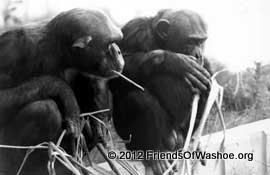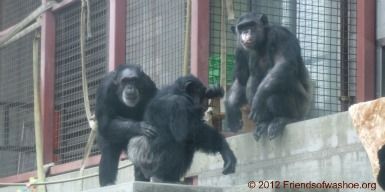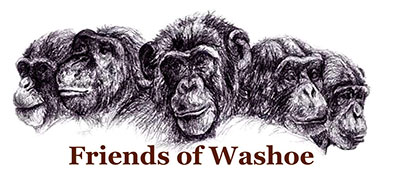About Friends of Washoe

Established in 1981, Friends of Washoe is a non-profit organization (501.c3) dedicated to the welfare of chimpanzees and especially the chimpanzees Tatu and Loulis, the two remaining members of Washoe's family.
Washoe, who passed away in October of 2007, took the idea of talking with animals out of the realms of fables and science fiction, and into the realm of scientific fact. Her accomplishments over the past three decades have had profound effects on changing scientific thought, influencing a wide variety of academic disciplines. Being the first chimpanzee to learn a human language and pass it on to her adopted son, Washoe was truly unique. Her accomplishments have also helped humans better understand their responsibilities to our fellow animals.
Important changes in primate communication research and our understanding of the world continue to unfold. As human beings, we are evermore concerned with understanding and protecting our earth for the benefit of both human and non-human citizens.
While our human awareness and compassion is rapidly expanding to include a greater concern for our biosphere and its inhabitants, our ignorance still remains a critical problem. Communication is fundamental to removing ignorance and replacing it with understanding. We feel that communication is the one behavior most critical for future survival. Washoe has helped replace some of our ignorance about communication with an understanding of ourselves, as well as other beings. This is one reason why we have committed our lives to a project that focuses on the understanding of communication and chimpanzees.
Research at CHCI was unique in that neither the research nor the researchers have first priority. Our philosophy is that the chimpanzees did not apply for immigration status; they were, and still are, incarcerated against their wills. While we can leave the building when we wish, the chimpanzees cannot. We, as researchers and more importantly as friends and caring human beings, must do as much as possible to better the lives of chimpanzees.
Through Friends of Washoe, we have persistently worked to help save free-living chimpanzees and captive chimpanzees from senseless exploitation and extinction. We attribute much of our success to what Washoe has taught us.
Another goal of Friends of Washoe is to support the humane and innovative studies that focus on the study of chimpanzee language acquisition, communication, and its application to human understanding and compassionate care for chimpanzees.

About the Chimpanzee and Human Communication Institute
The Chimpanzee and Human Communication Institute (CHCI) located on the campus of Central Washington University provided sanctuary for the chimpanzees: Washoe, Moja, Loulis, Tatu, and Dar beginning in 1983, until the last remaining chimpanzees, Tatu and Loulis were moved to Fauna Foundation in August 2013. Although the chimpanzees have left, our primary goal remains: ensuring the well-being and protection of these chimpanzees by guaranteeing their freedom from invasive or disruptive research, by maintaining a safe, healthy, and interesting environment, and respecting and providing for their individual needs. Friends of Washoe remains committed to ensuring the well-being of Tatu and Loulis at their home in Quebec where the Fauna Foundation is Located.
CHCI’s second goal was to encourage in other humans respect, responsibility, and compassion for all of our fellow apes by offering unique, engaging educational programs and resources to elementary, secondary, and post-secondary students and the public at large.
CHCI’s third goal was to promote quality, humane research on the communication and behavior of the chimpanzees in our care, as well as research that furthers both the care of captive chimpanzees and conservation efforts to save chimpanzees from extinction by serving as a resource for the students of Central Washington University, its faculty, and visiting scientists.
In accomplishing our mission, we served the mission of Central Washington University as well. The sense of compassion and service we fostered prepared students for “responsible citizenship.” Our focus on respectful and dignified interaction with all beings encouraged in our students and visitors a “responsible stewardship of the Earth.” The skills and critical inquiry we taught helped our students live “enlightened, productive lives.” CHCI also played an active role in supporting diversity within the sciences by encouraging women and other minorities to enter science.
The Chimpanzee and Human Communication Institute worked to inspire in all those whom we contacted – be they students, scientists, or the general public – the realization that we must replace human exploitation with human compassion, that responsible citizenship requires protection of the Earth for all life, and that the essence of justice is the guarantee that all beings can live naturally, free from objectification and exploitation.

